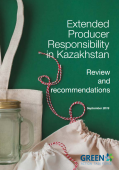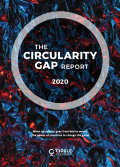While plastic pollution is a global problem, around 60 percent of marine plastic debris enters the ocean from just five countries: China, Indonesia, Thailand, Vietnam, and the Philippines. This report focuses on the challenge of managing plastic packaging waste in Southeast Asia and China. In addition to showing the scale of the challenge, the report gives an idea of the funds that could be raised if these countries introduced extended producer responsibility (EPR) schemes, under which companies that place plastic packaging on the market cover the costs of its proper management—from collection and sorting to recycling and disposal.

This report analyses the current legal framework and operational set-up for Extended Producer Responsibility (EPR) in Kazakhstan and makes recommendations for strengthening and improving the current system further.

The Circularity Gap Report provides on-the-ground examples from across the globe to illustrate the practical implementation of circular economy strategies and solutions.
While other sectors are accelerating their emissions reductions, the share of emissions from heavy industry is projected to increase dramatically under business as usual. As such, industry has a key role to play in the decarbonisation of the European economy to fulfill the EU’s commitments under the Paris agreement. This report explores the technical and economic aspects of the transition and suggests methods to be employed to enable climate neutrality in heavy industry.
This report highlights processes that contribute to the circular economy shift by retaining the value of the products within the system through the extension of their useful life. It quantifies the current-state and potential impacts associated with the inclusion of different value-retention processes by applying them to a series of products within three industrial sectors. The report also highlights the different barriers faced in the implementation of the processes.
